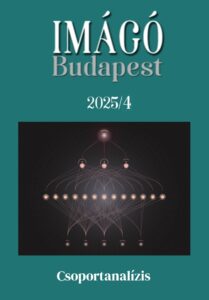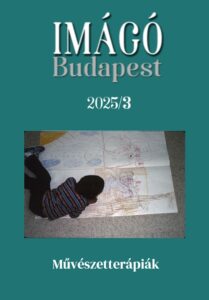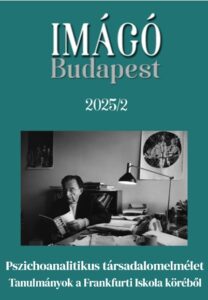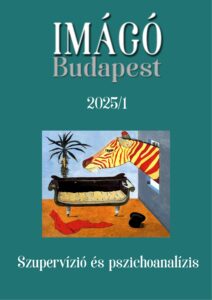Az IMÁGÓ Budapest az 1990 és 2010 között folyamatosan megjelent Thalassa folytatásaként, az Imágó Egyesület kiadásában megjelenő lektorált folyóirat. 2013-ig nyomtatásban, azóta online, szabadon elérhetően jelenik meg, továbbra is évente négyszer, többnyire tematikus számok formájában.
Az IMÁGÓ Budapest nevében a „Budapest” megjelölés a pszichoanalízis „budapesti iskolájának” hagyományaira, Ferenczi Sándor, Róheim Géza, Hermann Imre, Hollós István, Bálint Mihály, Bálint Alice és mások munkásságára kíván utalni, középpontba állítva a magyarországi és a nemzetközi pszichoanalízis történetét, elméleti kérdéseit, a legszélesebb értelemben vett humán tudományokhoz, a kultúrához, az irodalomhoz és a művészetekhez való viszonyának problémáit. Ugyanakkor arra törekszik, hogy lépést tartson a modern társadalomtudományok és a pszichoanalízis legújabb fejleményeivel is. Az Imágó Budapest nem kötelezi el magát egyetlen lélekelemzési irányzat mellett sem, de hangsúlyozott figyelemben kívánja részesíteni a pszichoanalízis filozófiai és társadalomtudományi alapjait és alkalmazási lehetőségeit bemutató, illetve elemző írásokat. A lapot a Pécsi Tudományegyetem Pszichológiai Doktori Iskolája elméleti pszichoanalízis programjának közreműködésével szerkesztjük.
Az IMÁGÓ Budapest egyes számai többnyire előre meghatározott tematikus blokkokra, felkért szerzők tanulmányaira, illetve fordításokra épülnek, de a lap nyitva áll a beküldött kéziratok közlésére is, amelyek szigorú lektorálási folyamaton mennek keresztül.
A folyóirat folyamatosan vár tanulmányokat az alábbi témakörökhöz kapcsolódóan:
- a pszichoanalízishez és határterületeihez kapcsolódó újabb kutatási eredményekről
- a pszichoanalízis és kultúra (irodalom, film stb.) találkozásának interdiszciplináris területeiről
- a pszichoanalízis és az aktuális társadalmi kérdések kapcsolatáról
- a pszichoanalízis történeti múltjának kutatásáról
- a pszichoanalízis mint terápiás módszer modern elméleti kérdéseiről
Az IMÁGÓ Budapest peer-reviewed folyóirat, a benne megjelenő tanulmányok tudományos publikációként fogadhatók el. A beküldött kéziratok szerkesztői előszűrésen, majd lektorálási folyamaton mennek keresztül. A kéziratok formai követelményeiről a szerzők a honlapon tájékozódhatnak. A kéziratokat az imago@imagoegyesulet.hu e-mail címre várjuk.
AIMS and SCOPE
IMÁGÓ Budapest is a Hungarian-English language peer-reviewed online journal, the continuation of the journal Thalassa (published between 1990 and 2010). Until 2013 it was published in printed form and since then it has been an open access online periodical, appearing four times a year, mostly in thematic issues. As an interdisciplinary journal Imagó Budapest accepts a wide range of manuscripts on the history and current theoretical and practical developments of psychoanalysis and related areas. The title of the journal refers to the well-known psychoanalytic journal Imago founded by Otto Rank and Hanns Sachs and shares its objectives. The word “Budapest” in the title of the journal refers to the tradition of the Budapest School of psychoanalysis and the oeuvre of Sándor Ferenczi, Géza Róheim, Imre Hermann, István Hollós, Mihály Bálint, Alice Bálint and others. The history of Hungarian and international psychoanalysis, its theoretical problems and its relation to human sciences, literature and arts are in the core of the interest of the editors.
The journal welcomes studies on the following topics:
- recent research findings related to psychoanalysis and its borderlands
- the intersections of psychoanalysis and culture (literature, film, etc.)
- the relationship between psychoanalysis and current social issues
- research on the history of psychoanalysis
modern theoretical issues of psychoanalysis as a therapeutic method
The issues of IMÁGÓ Budapest are usually built on thematic blocks of studies by invited authors, but the journal is also open to the publication of submitted manuscripts, which go through a careful review process. We expext the manuscripts to imago@imagoegyesulet.hu.
PUBLICATION ETHICS AND MALPRACTICE STATEMENT
You can find our statement here.




